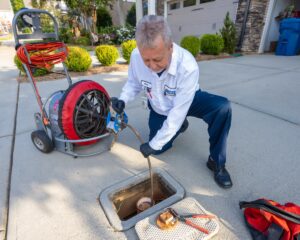That Slow Drain: When to Call a Pro
Is water rising around your ankles in the shower? Kitchen sink taking forever to empty after doing dishes? I get it – it’s tempting to think, “It’s just draining slowly, no big deal.”
After 15 years of crawling under sinks and snaking drains, let me share something important: that slow drain is your pipes trying to tell you something. And trust me, the longer you ignore it, the louder (and more expensive) that message becomes.
What’s Happening Down There?
Think of your pipes like arteries. When cholesterol builds up, blood flow slows down before a complete blockage happens. Your drains work the same way.
In bathroom sinks and showers, it’s usually a nasty cocktail of hair, soap scum, and skin cells forming a clog that grows over time. In kitchens, it’s typically grease and food particles. That goop doesn’t just sit there—it attracts more goop until water barely squeezes through.
Last month, I pulled a clog from a customer’s shower drain that looked like a small animal. It had been building for years while they just lived with a slow drain. By the time they called us, water was backing up into their basement.
DIY vs. Calling a Plumber
I’m all for DIY when it makes sense. Try a plunger. Try a $3 plastic drain snake. But when those don’t work, it’s time to put down the chemical drain cleaner (which often does more harm than good) and pick up the phone. Here’s when you definitely need a pro:
- Multiple drains are slow. This usually signals a problem in your main line, not just in one fixture. If your toilet gurgles when you drain the bathtub, or your basement floor drain backs up when you run the washing machine, something bigger is happening.
- You’ve tried the easy fixes without success. If you’ve already plunged and snaked without improvement, the clog is likely beyond the reach of consumer tools. Our professional equipment can reach much farther.
- There’s a smell coming from the drain. That odor means something is decomposing in your pipes. The longer it sits, the more it can corrode your plumbing from the inside.
- Your drain keeps slowing down despite temporary fixes. If you’re getting brief relief after treatments but the slow draining returns quickly, you likely have a recurring buildup issue that needs professional attention.
What We’ll Do When We Get There
When you call Benjamin Franklin Plumbing for a slow drain, we don’t just show up with a bottle of the same stuff you can buy at the store. We bring the serious equipment:
- First, we figure out what we’re dealing with. Sometimes that means running a tiny camera down your drain to actually see the clog. (Side note: people are always fascinated by this part you’d be surprised what we find in there!)
- For most clogs, we’ll use a professional-grade auger (what we call a snake) that can reach much farther than the consumer versions. For tougher situations, we might use hydro jetting—essentially power washing the inside of your pipes.
- We don’t just push the clog further down the line where it’ll cause problems tomorrow. We break it up and remove it completely.
- Then we test everything to make sure water flows perfectly before we pack up. And we clean up after ourselves. No mess, no fuss.
Why Waiting Is a Bad Idea
A slow drain isn’t just an annoyance—it’s often the first warning of bigger problems. Continuous slow draining leads to standing water, which can damage fixtures and seals. Partial clogs can trap debris, which attracts bacteria. That’s where those funky smells come from. The longer water sits in your pipes, the more it can corrode them from the inside.
And here’s the kicker, a completely blocked drain can build up pressure that finds the weakest point in your plumbing. That might be a joint under your sink or behind your wall. When that gives way, you’ve got a leak or even a burst pipe on your hands.
Quick Answers to Common Questions
Will chemical drain cleaners fix the problem?
Rarely permanently. And they can damage older pipes, especially if used repeatedly. They’re harsh on your plumbing and the environment.
How often should drains be professionally cleaned?
For most homes, a professional cleaning every 1-2 years prevents buildup before it becomes problematic. If you have older pipes or lots of people with long hair, you might need it more often.
How much does professional drain cleaning cost?
It all depends on the complexity of the situation, but it’s far less than dealing with water damage from a backup or burst pipe.
The Bottom Line
That slow drain isn’t going to fix itself. In fact, it’s probably getting worse while you’re reading this. A small issue today could be a flooding emergency next week.
At Benjamin Franklin Plumbing, we believe in fixing things right the first time. No band-aids, no temporary solutions. Just honest work that keeps your water flowing like it should. Give us a call. Your drains (and your future self) will thank you.

